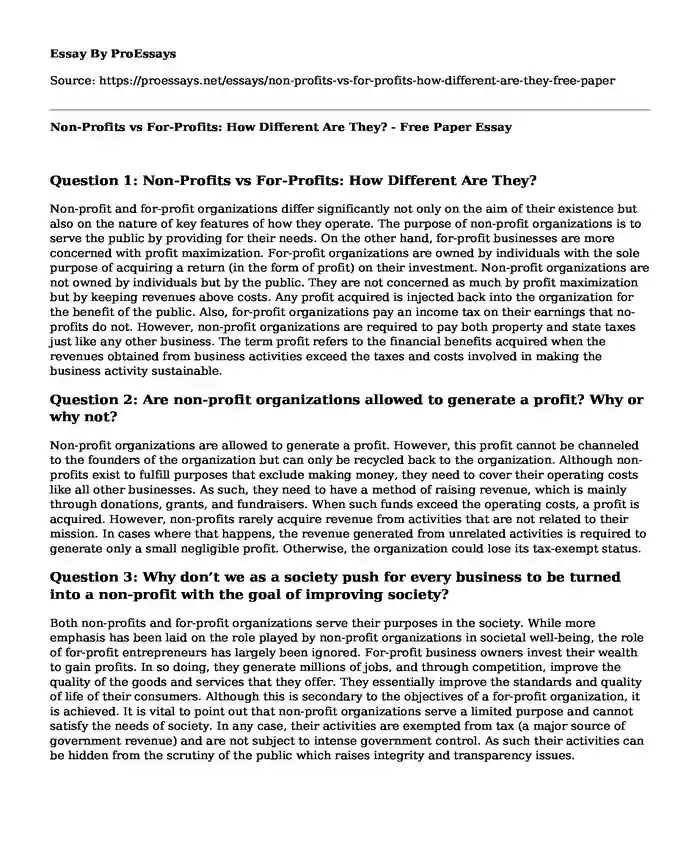Question 1: Non-Profits vs For-Profits: How Different Are They?
Non-profit and for-profit organizations differ significantly not only on the aim of their existence but also on the nature of key features of how they operate. The purpose of non-profit organizations is to serve the public by providing for their needs. On the other hand, for-profit businesses are more concerned with profit maximization. For-profit organizations are owned by individuals with the sole purpose of acquiring a return (in the form of profit) on their investment. Non-profit organizations are not owned by individuals but by the public. They are not concerned as much by profit maximization but by keeping revenues above costs. Any profit acquired is injected back into the organization for the benefit of the public. Also, for-profit organizations pay an income tax on their earnings that no-profits do not. However, non-profit organizations are required to pay both property and state taxes just like any other business. The term profit refers to the financial benefits acquired when the revenues obtained from business activities exceed the taxes and costs involved in making the business activity sustainable.
Question 2: Are non-profit organizations allowed to generate a profit? Why or why not?
Non-profit organizations are allowed to generate a profit. However, this profit cannot be channeled to the founders of the organization but can only be recycled back to the organization. Although non-profits exist to fulfill purposes that exclude making money, they need to cover their operating costs like all other businesses. As such, they need to have a method of raising revenue, which is mainly through donations, grants, and fundraisers. When such funds exceed the operating costs, a profit is acquired. However, non-profits rarely acquire revenue from activities that are not related to their mission. In cases where that happens, the revenue generated from unrelated activities is required to generate only a small negligible profit. Otherwise, the organization could lose its tax-exempt status.
Question 3: Why don’t we as a society push for every business to be turned into a non-profit with the goal of improving society?
Both non-profits and for-profit organizations serve their purposes in the society. While more emphasis has been laid on the role played by non-profit organizations in societal well-being, the role of for-profit entrepreneurs has largely been ignored. For-profit business owners invest their wealth to gain profits. In so doing, they generate millions of jobs, and through competition, improve the quality of the goods and services that they offer. They essentially improve the standards and quality of life of their consumers. Although this is secondary to the objectives of a for-profit organization, it is achieved. It is vital to point out that non-profit organizations serve a limited purpose and cannot satisfy the needs of society. In any case, their activities are exempted from tax (a major source of government revenue) and are not subject to intense government control. As such their activities can be hidden from the scrutiny of the public which raises integrity and transparency issues.
Question 4: Explain how one’s view of money, and particularly what non-profits should be doing with donations might affect one’s view of the Mormon Church’s $100 billion investment fund.
The Mormon church has built an investment stockpile of at least $100 billion investment fund mainly from member tithing. Having hidden this from its members, the information was recently brought to light by a whistleblower. As a non-profit organization, the presence of the huge investment fund raises legitimate concerns over the tax-exempt status of the investment arm of the church. while it is important to have a reserve for charitable activities, the church should have made its financial status available to donors. It is not in the nature of non-profits to amass wealth. As such, the organization should have used most of these funds already to help meet the objectives of reaching out to the poor and needy. Otherwise, if the Mormon Church plans to use the funds for investment, its tax-exempt status should be lifted.
Cite this page
Non-Profits vs For-Profits: How Different Are They? - Free Paper. (2023, Dec 02). Retrieved from https://proessays.net/essays/non-profits-vs-for-profits-how-different-are-they-free-paper
If you are the original author of this essay and no longer wish to have it published on the ProEssays website, please click below to request its removal:
- Labor Disputes on Jet Airways
- North Texas Food Bank Paper Example
- Audience Development in Dior Exhibition at V&A Museum London - Essay Sample
- Research Paper on Advertising in Modern Business: Misleading Clients?
- Essay Example on Business Ethics: A Guide to Creating a Positive Workplace Environment
- Essay on Globalization: Unifying Cultures and Changing Buyer Behaviour
- Paper Example on IAWP: Strengthening Women in Policing since 1915







